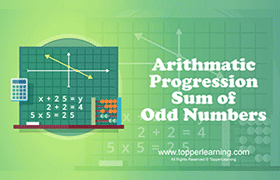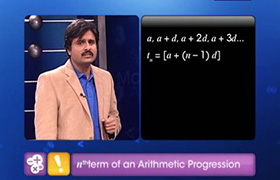CBSE Class 10 Answered
Let a be the first term and d be the common difference in arithmetic progression.
If sum Sm of m terms is n , then we have
 ......................(1)
......................(1)
From above expression, we get ,
 .......................... (2)
.......................... (2)
If sum Sn of n terms is m , then we have
 .............................(3)
.............................(3)
From above expression, we get
 .....................(4)
.....................(4)
By subtracting eqn.(4) from eqn.(2) , we get

 ....................... (5)
....................... (5)
Sum of (m+n) terms is


From eqn.(1) , we know that first term of above expression is n .
From eqn.(3) , we know that first term of above expression is m
Hence above expression becomes.

Using eqn.(5) , above expression is written as

Hence sum of (m+n) terms of arithmetic progression is -(m+n).
-----------------------------------------












